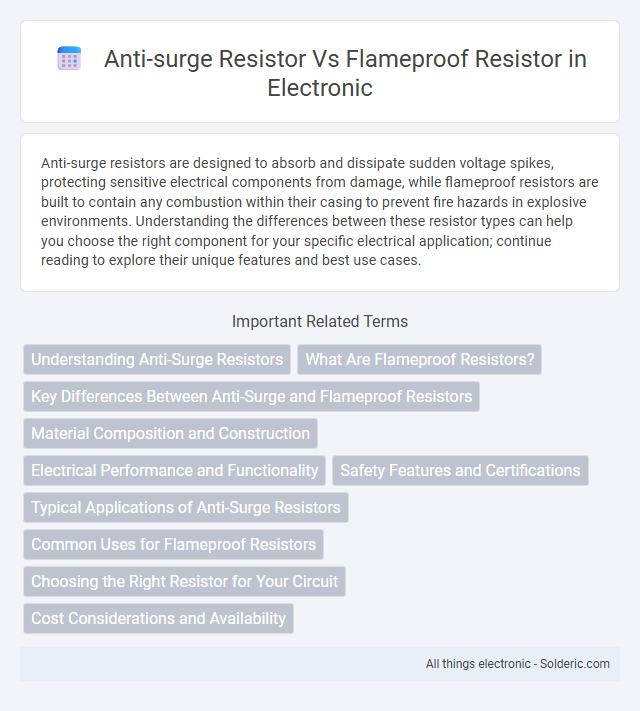Anti-surge resistors are designed to absorb and dissipate sudden voltage spikes, protecting sensitive electrical components from damage, while flameproof resistors are built to contain any combustion within their casing to prevent fire hazards in explosive environments. Understanding the differences between these resistor types can help you choose the right component for your specific electrical application; continue reading to explore their unique features and best use cases.
Comparison Table
| Feature | Anti-Surge Resistor | Flameproof Resistor |
|---|---|---|
| Purpose | Protects circuits by dissipating surge energy | Prevents ignition in flammable environments |
| Primary Application | Surge suppression in power electronics | Use in hazardous, explosive atmospheres |
| Construction | High pulse energy rating; robust design | Encased in flameproof housing or coating |
| Safety | Protects electronics from voltage spikes | Prevents fire and explosion risks |
| Standards | Complies with surge handling standards (IEC, IEEE) | Certified for hazardous locations (ATEX, IECEx) |
| Typical Resistance Range | Low to medium ohms, designed for energy absorption | Varies; chosen based on circuit needs and safety |
| Cost | Moderate; depends on energy rating | Higher due to specialized safety features |
| Durability | High pulse tolerance, moderate environment resistance | High durability in harsh/explosive environments |
Understanding Anti-Surge Resistors
Anti-surge resistors are specially designed to withstand high energy pulses and voltage spikes, protecting sensitive electronic components from damage caused by sudden surges. Unlike flameproof resistors, which primarily focus on preventing fire hazards by containing flames during failure, anti-surge resistors emphasize energy absorption and durability under transient conditions. Understanding these differences helps you select the right resistor type to ensure circuit stability and safety in high-stress electrical environments.
What Are Flameproof Resistors?
Flameproof resistors are designed to prevent ignition of surrounding gases or dust by containing any internal sparks or flames within their hermetically sealed casing, ensuring safety in hazardous environments. These resistors comply with stringent international safety standards such as ATEX and IECEx, making them ideal for use in explosive atmospheres like oil refineries, chemical plants, and mining operations. Your choice of flameproof resistors enhances protection against fire hazards while maintaining reliable electrical performance under extreme conditions.
Key Differences Between Anti-Surge and Flameproof Resistors
Anti-surge resistors are designed to handle high energy pulses and voltage spikes, protecting electronic circuits from transient surges, whereas flameproof resistors are built to prevent ignition by containing any internal sparks or flames within a flame-retardant casing. The primary distinction lies in their application: anti-surge resistors focus on managing electrical stress, while flameproof resistors ensure safety in hazardous and explosive environments. Material construction and certification standards further differentiate these resistors, with flameproof types often adhering to strict explosion-proof regulations.
Material Composition and Construction
Anti-surge resistors are typically constructed using high-purity wire-wound elements embedded in ceramic or epoxy materials to withstand rapid voltage spikes and dissipate energy efficiently. Flameproof resistors incorporate flame-retardant materials and hermetic sealing often using metal oxide or wire-wound cores with special coatings designed to prevent ignition and contain explosions under fault conditions. The material composition of flameproof resistors emphasizes fire resistance and containment, while anti-surge resistors prioritize thermal stability and transient suppression.
Electrical Performance and Functionality
Anti-surge resistors provide superior transient voltage suppression and energy absorption capacity, protecting circuits from voltage spikes and surges effectively. Flameproof resistors are designed to contain internal faults and prevent ignition, ensuring safety in hazardous environments while maintaining stable resistance under thermal stress. Both resistors offer reliable performance, but anti-surge resistors prioritize electrical surge protection, whereas flameproof resistors focus on safety and fire resistance in explosive atmospheres.
Safety Features and Certifications
Anti-surge resistors are designed to withstand high energy pulses and transient voltages, enhancing electrical circuit protection by preventing damage from sudden surges, and typically comply with IEC and UL standards for surge withstand capacity. Flameproof resistors are constructed with robust, fire-retardant materials to contain any internal arc faults or combustion, meeting rigorous safety certifications such as ATEX and IECEx for hazardous environments. Both resistor types prioritize safety, but anti-surge resistors focus on electrical durability, while flameproof resistors emphasize fire containment and explosion-proof certification compliance.
Typical Applications of Anti-Surge Resistors
Anti-surge resistors are primarily used in power electronics to absorb sudden voltage spikes, protecting sensitive components like semiconductors and ensuring system reliability in applications such as motor drives, inverters, and switchgear. They play a crucial role in mitigating transient overvoltages in industrial automation and renewable energy systems. Your electrical systems benefit from enhanced protection and longevity when incorporating anti-surge resistors in these demanding environments.
Common Uses for Flameproof Resistors
Flameproof resistors are commonly used in industrial applications where safety and reliability are critical, such as in power distribution, heavy machinery, and explosive environments like mining or chemical plants. These resistors are designed to withstand high temperatures and prevent the spread of flames, ensuring your equipment operates safely under extreme conditions. Their robust construction makes them ideal for circuits exposed to potential overloads and short circuits, providing protection and maintaining system integrity.
Choosing the Right Resistor for Your Circuit
Selecting the right resistor for your circuit depends on factors such as voltage, power rating, and environmental conditions. Anti-surge resistors are designed to withstand high-energy pulses and transient surges, making them ideal for circuits prone to sudden voltage spikes. Flameproof resistors provide enhanced safety by preventing ignition in hazardous environments, suitable for applications requiring strict fire protection standards.
Cost Considerations and Availability
Anti-surge resistors generally cost more due to their specialized design for handling high energy pulses and transient overloads, making them less widely available compared to standard resistors. Flameproof resistors, designed to prevent ignition in hazardous environments, often have a broader market presence and lower cost due to standardized certifications and mass production. Procurement decisions should weigh the initial price difference against application-specific safety requirements and supply chain accessibility.
anti-surge resistor vs flameproof resistor Infographic

 solderic.com
solderic.com